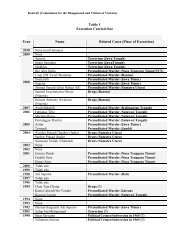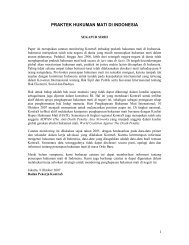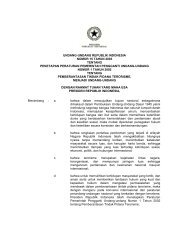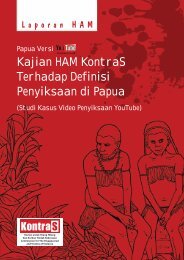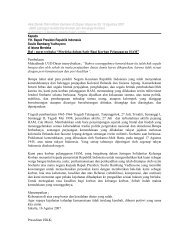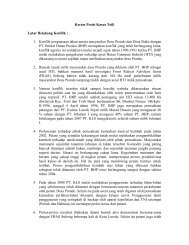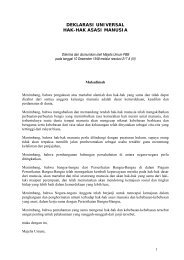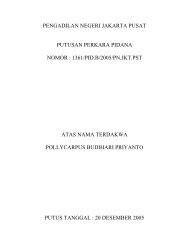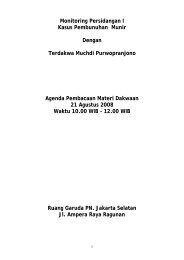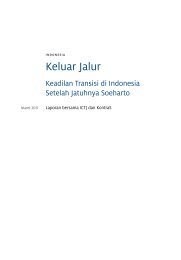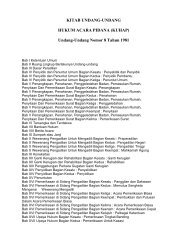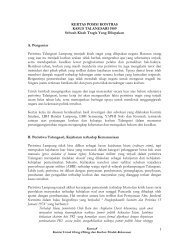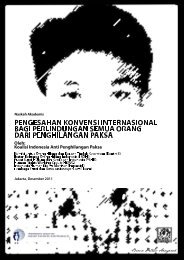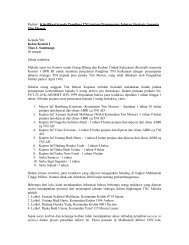INTERNATIONAL HUMAN RIGHTS TREND - KontraS
INTERNATIONAL HUMAN RIGHTS TREND - KontraS
INTERNATIONAL HUMAN RIGHTS TREND - KontraS
- No tags were found...
You also want an ePaper? Increase the reach of your titles
YUMPU automatically turns print PDFs into web optimized ePapers that Google loves.
<strong>INTERNATIONAL</strong><strong>HUMAN</strong> <strong>RIGHTS</strong><strong>TREND</strong>1
International Human Rights Trend<strong>KontraS</strong> and International Advocacy: Our Struggle to Uphold the Values andPrinciples of Human Rights WorldwideAn interview with Sri Suparyati (Staff at the Research Bureau for International Advocacy, the Commission for theDisappeared and Victims of Violence)1. What does International advocacy mean to <strong>KontraS</strong>?International advocacy is one of <strong>KontraS</strong>’ efforts to encourage theimplementation of certain policies on human rights with the helpof international organizations and regional organizations’ supportas our respond to human rights violations happening withina country. <strong>KontraS</strong> is also able to conduct international advocacyindividually or through civil society networks outside Indonesia.Advocacy efforts can also use the opportunity of mechanisms /instruments available at the UN. Sometimes this effort is carriedout not only to situations outside of Indonesia, but it could alsoparticipate in the initiatives of the international community to theproblems in Indonesia. <strong>KontraS</strong>’ role in international advocacyis also used upon the government of Indonesia, for instance, bybuilding solidarity on the issue in foreign countries such as thecase of Syria or North Korea to thrust into the mechanisms of thegovernment and politics in Indonesia. The aim is to encouragethe Indonesian government to take response to the poor situationoutside Indonesia, for it is the constitutional mandate of Indonesiato “[…] contribute and maintain world peace”. As part of its international work, <strong>KontraS</strong> has also actively participatedand initiated several international meetings involving many stakeholders in the international communityfor media sharing, expanding networks and solidarity between countries in the arena of discussion of the CSOs,including intellectuals / academics.2. As an Indonesian NGO focusing on human rights issues, how significant is conducting international advocacyto <strong>KontraS</strong>?<strong>KontraS</strong>, as a human rights NGO has been an international advocate not long after <strong>KontraS</strong> was established. Atthat time, the international advocacy efforts undertaken are related to the kidnappings of activists advocating1997/1998. Together with the AFAD (Asian Federation against Involuntary Disappearance) conducted lobbyingat the UN including the use of complaint mechanisms at the level UNWGEID. <strong>KontraS</strong> view that internationaladvocacy also has significant opportunities to support advocacy efforts at the national level of <strong>KontraS</strong>, since Indonesiais also a part of the international subject which has ratified several international important human rightsinstruments, thus we believe that Indonesia must, of course stay within the corridor. In addition, in responseto world conditions and human rights situation, it is important for <strong>KontraS</strong> to also contribute in responding toissues, given that it has become an integral part of the concrete work of <strong>KontraS</strong> that is not separated from ourcriticisms and effort in building Indonesia’s commitment to uphold human rights.3. How does <strong>KontraS</strong> usually conduct its international advocacy? Through what means?<strong>KontraS</strong> conducts international advocacy by utilizing a number of ways such as using the opportunity to reportcases using the UN mechanism, engaging solidarity with other international organizations by inviteng them tomake a joint statement, urgent appeal and other appeal letters. <strong>KontraS</strong> is also involved in international humanrights solidarity campaign by creating programs and events, as a repond to urgent human rights situations (itmay manifest in a form of exhibition, seminar, discussion, or demonstration, or even meetings with diplomats inembassies) This effort can at least provide intervention and influence the situation of the victims of human rightsviolations.4. Which international human rights organizations or coalitions has <strong>KontraS</strong> endorsed so far?Several international organizations or coalitions which have been endorsed by <strong>KontraS</strong> includes organizationswhere <strong>KontraS</strong> acts as a member, such as FIDH (the International Federation for Human Rights), ADPAN (Anti-2
Death Penalty Asia Network), AFAD (Asian Federation against Involuntary Disappearance), The Solidarity forAsian People’s Advocacy Task Force on ASEAN and Human Rights (SAPA TFAHR), Open North Korea, HRBA2J(Human Rights Based Access to Justice), and FORUM-ASIA; on the other hand <strong>KontraS</strong> advocacy partners includeAmnesty International, Tapol, Human Rights Watch, Asia Human Rights Commission, Perkumpulan HAK (TimorLeste), JSMP (Timor Leste) and Indonesian Solidarity (Australia).5. Can you mention international human rights issues that have been advocated by <strong>KontraS</strong>?There are many issues that try to be advocated by <strong>KontraS</strong> at the international level.International Human Rights TrendFirst, the issue of past human rights violations, <strong>KontraS</strong> has built solidarity with several other organizations at theinternational level such as the FIDH, Amnesty International, Human Rights Watch, AFAD, AHRC to provide pressureto the relevant institutions at national level Indonesia.Secondly, the issue of threats to civil and political rights, <strong>KontraS</strong> has maintained contacts with similar organizationsto issue urgent appeals, or joint statements to ask other organizations to contribute to pressure on therelated cases. In many instances, <strong>KontraS</strong> also has used some of the mechanisms available in the UN such asthe Individuals compliant as well as several other interventions that are available at the special rapporteur, or incertain trial schedules.Third, <strong>KontraS</strong> also has a high concern on some of the emerging human rights issues in other countries such aspolitical and human rights situation in Burma / Myanmar, North Korea, Syria, etc. For that reason, <strong>KontraS</strong> is alsoactive in the support to develop the human rights agenda of a certain state to respect human rights. Moreover,<strong>KontraS</strong> also provides support in every appeal letter (endorsement) that is submitted by any organization to <strong>KontraS</strong>as a CSO representative in Indonesia.Fourth, on the case of AICHR, <strong>KontraS</strong> as part of a coalition of civil society in ASEAN, has an important role inperforming critical monitoring to the performance of this regional institution. Factor of transparency, accountabilityand cooperation with the civil society is still a red mark within the report card of AICHR. Another thingrelated to AICHR is the disparity between the relation with local CSOs in each country, practically no more than3 countries that are conducting good relations with CSOs, and even that we perceive as far from optimal. Alsorelated to the preparation of the ASEAN Declaration of Human Rights, AICHR has failed to become a bridgebetween the CSOs and the government. Many inputs and requests have been submitted by the CSOs, but nonewere responded. Preparation of AHRD is very secretive and there is still no guarantee of the application of internationalhuman rights standards.6. Does <strong>KontraS</strong>’ support to international human rights issues affect the protection of human rights in Indonesia?It is very difficult to answer straight forward questions like this, given the fact that the success of interationaladvocacy cannot be measured instantly, and cannot affect the protection of human rights in Indonesia directly.However, many of the enforcement of human rights executed by the Indonesian government were a part ofa repond towards <strong>KontraS</strong>’ advocacy efforts; our urgent appeals, open letters, demonstrations, and as well asinternational solidarity coalitions against the sate and human rights abuses in the country. It is hoped that ourparticipation and our voice in international solidarity campaigns can foster greater international support to helpurge the Indonesian government to resolve the human rights violations happening within the country.3
International Human Rights Trend20 March 2012Letter to Ban Ki-moon on the Subject of Key Human Rights Issues in IndonesiaBackgroundAs one of the fundamental pillars of the United Nations, the issue of human rights can never be underminedunder any circumstances. <strong>KontraS</strong> along with FIDH fully acknowledge this conception, therefore we perceiveBan Ki-moon’s recent visit to Indonesia on 20-21 March 2012 as a momentum to further strengthen Indonesia’scommitment as a democratic country in upholding and respecting human rights by gaining international supportfrom the United Nations. Thus, a closed letter on the key issues of human rights in Indonesia was sent to BanKi-moon.Although Indonesia is known as a democratic country that has made notable progress in transitioning from anauthoritarian rule to a new democracy, a number of institutional challenges and shortcomings are still seriouslyundermining the rule of law and democracy and threatening to negate the gains Indonesia has made.The issueThere are three critical problems regarding human rights violations that are occurring in Indonesia up until today.The problems encompass the issue of persistent impunity, militarization in Papua and West Papua and statesanctionedreligious intolerance.In Indonesia, perpetrators for serious human rights violations that committed both during the rule of Suhartoand since his fall from power, have rarely been brought to justice, instead, they are hiding under the comfort ofimpunity. Since 1998, a number of important legislative and legal measures were introduced, including the lawsthat mandate the creation of ad hoc and permanent human rights courts in Papua and Aceh. However, thesecourts have yet to be established by the government of Indonesia.A prime example is how Maj. Gen. (ret.) Muchdi Purwoprandjono, the individual who ordered the assassination8
International Human Rights Trendof prominent human rights defender Mr Munir Said Thalib in 2004, has not been brought to justice. The case isa strong indication how entrenched impunity is in Indonesia, especially in cases involving military personnel.Even though in February 2012, President Yudhoyono informed foreign diplomats his acknowledgment that bothpolice and military personnel were responsible for human rights violations and promised that these cases wouldbe brought to court and perpetrators brought to justice, little has been done in reality by the police, the militaryand the government to guarantee the right to truth, justice, reparation and non-repetition. In fact, recent reportsprove that human rights violations’ by the police and the military continue to be documented, particularly inPapua.One of our major concerns explicated in the letter also comprised of the status quo of the militarization in Papuaand West Papua. The heavily militarized approach to the administration of Papua must be put to end and arights-based and political dialogue approach must be adopted to address the grievances of the Papuan population.Currently, there are at least 90 individuals imprisoned in Papua and Maluku for their peaceful pro-independenceaction or views, including Papuan activist Mr. Filep Karma, whose imprisonment has been determined to be inviolation of international law by the UN Working Group on Arbitrary Detention (Opinion No. 48/2011).In October 2011, state security forces violently dispersed a Papuan Peace Congress, resulting in at least 3 deathswhile dozens were injured and more than 300 Papuans arrested, six of whom have been charged for treason.An investigation by Komnas HAM pointed to serious violations by security forces. In November, the President’sOffice rejected the Commission’s findings on the ground that the police was still handling the case.It is believed that more than 14,000 military personnel have been deployed in Papua. We are also particularlyconcerned with how the military continues to receive significant financial benefits from the security it providesto business enterprises, including the company PT Freeport. It is therefore discreditable to know that the militarystill continues to generate income through its own business holdings, despite the requirement of Law No.34/2004 on the Indonesian Armed Forces (the TNI Act) that all military business be shut down or taken over bythe government by October 2009.Moreover, intolerance towards religious minorities is also rising alarmingly in Indonesia. The escalating violenceand intimidation against the Ahmadiyya and other religious minorities are made worse by a culture of impunityand discriminatory laws and practices that strengthen the chance of radical groups to conduct violence andintimidation, knowing there will be no strict consequence to their unlawful actions.Several discriminatory laws still applied in Indonesia include the 1965 Blasphemy Law that criminalizes expressionof religious beliefs that deviate from the central tenets of the 6 official religions, the government’s decree on theconstruction of places of worship in 2006 that has arbitrarily denied the requests to build houses of worship particularlyof minority religions. One of them is the case of the repeated refusal by the mayor of Bogor to allow theconstruction of a church by the Yasmin Church (GKI), despite having already obtained a permit by the SupremeCourt order that authorized the construction.In 2008, the Minister of Religious Affairs, the Attorney General, and the Minister of the Internal Affairs alsoissued a joint decree to prohibit the minority Muslim sect Ahmadiyya from promoting their belief in Indonesia.Meanwhile, later in September 2010, the Minister of Religion then publicly called for an outright ban of the Ahmadiyyafaith. A serious violation of the International Covenant on Civil and Political Rights (ICCPR), this decreeis. As a consequence, violent incidents targeting the Ahmadiyya have risen over the years, resulting in injuriesand deaths. Regrettably in many of these events, the police did not take adequate action to protect the victims.Our say upon the matterFor all the abovementioned reasons, in the open letter to Ban Ki-moon, <strong>KontraS</strong> together with FIDH expressedour grave concerns over the ongoing pressing human rights issues and thus strongly urged Secretary General toraise this matter with the Indonesian authorities during his visit and urge them to implement the long-standingrecommendations made by civil society, Komnas HAM, and UN human rights mechanisms. We also stronglyrecommended him to spare the time to meet with independent civil society organizations in Indonesia to discussupon these serious concerns.9
International Human Rights Trend7 March 2012Against Threats to Prosecute Human Rights Defender: Gustav KawerBackgroundIt was on 21 February 2012 at the Jayapura State Court in Papua province, when the sixth session of the trial ofForkorus Yaboisembut, Edison Waromi, Dominikus Surabut, Selpius Bobii and Agustus Kraar took place. Duringthe defense team’s examination of the witnesses for the prosecution, it was reported that the public prosecutorMr. Julius Teuf continually interrupted Mr. Kawer. Eventually Mr. Kawer asked him “Prosecutor, where is yourbrain? I am still proceeding with my questioning, so would you kindly stop disturbing me?” Mr. Teuf reportedlythen fell silent.During a later session of the trial on 24 February, the public prosecutor formally requested the court records ofthe 21 February session, with the stated intention of reporting a suspected crime to the provincial police headquarters.At the end of the session, the legal team discovered from the court that Mr. Kawer was the subject ofthis report, as the public prosecutor had felt harassed by his sentence “Prosecutor, where is your brain?”The issueAt the moment, the case has been reported to the Indonesian Advocates Association, Peradi, who have publiclystated that according to their view, Mr. Kawer made the remarks in question in the course of defending hisclients, and he cannot therefore be threatened with prosecution in connection with these remarks. While apparentlythe threat to report Mr. Kawer’s actions to the police has been widely reported, both publicly and to Mr.Kawer himself, no formal action or explanations on the part of the prosecutors have yet been forthcoming.It is worth noting that the national and international protection of lawyers as human rights defenders IndonesianLaw No 18/2003, known as the Advocates Law, clearly states that a legal advocate has the right to freedom ofexpression and the right not to be subject to criminal or civil action in relation to the performance in good faithof his or her professional duties in defending a client in court.Moreover, the UN Declaration on Human Rights Defenders includes the right to provide professionally qualifiedlegal advice and assistance in defending human rights (Article 3(c)) and imposes an obligation on the state to“take all necessary measures to ensure the protection of everyone against any violence, threats, retaliation, adversediscrimination, pressure or any other arbitrary action as a consequence of his or her legitimate exercise ofthe rights referred to in the Declaration” (Article 12 (2)). Thus we are certain that human rights defenders have aright to protection, and states are responsible for ensuring this protection.In particular, guarantees for the functioning of lawyers are further elaborated by the UN Basic Principles on theRole of Lawyers stating that governments shall ensure that lawyers (i) “are able to perform all of their professionalfunctions without intimidation, hindrance, harassment or improper interference”; and (ii) “shall not suffer,or be threatened with, prosecution or administrative, economic or other sanctions for any action taken in accordancewith recognized professional duties, standards and ethics” (Article 16).Our say upon the matterIn this regard, we share a high concern on the safety of Mr. Kawer and the wider impacts of threats madeagainst him on the legal team for the defense. Thus, <strong>KontraS</strong> together with Australian West Papua Association,East Timor and, Indonesia Action Network, Faith-based Network on West Papua, Franciscans International, IndonesiaHuman Rights Committee and the West Papua Advocacy Team would therefore requestWe therefore, through a letter of urgent appeal, requested Mrs. Margaret Sekaggya, Special Rapporteur on thesituation of human rights defenders of the Office of the High Commissioner for Human Rights to raise this matterwith the Indonesian government promptly as a matter of urgency.10
International Human Rights Trend20 February 2012Our Deep Concern Regarding the Criminalization of Judge Baltasar GarzonBackgroundOn 9 February 2012, the SecondChamber of the SupremeCourt of Spain condemnedJudge Baltasar Garzón Real,in a sole instance - this obviouslybeing contrary to theEuropean Convention for HumanRights, and had causedhim suspended from workingas a judge for 11 years.Proceedings were instigatedagainst Judge Garzón due tothe investigation he led intothe political corruption caseknown as “Gurtel” whichinvolved members of thePartido Popular.Garzón was also chargedwith illegally wiretappingphone conversations of detaineeswho apparently were caught on infringing the law while in prison, with the help of their lawyers.Although as human rights organizations we highly respect the confidentiality of lawyer-client relations as fundamentalin a society governed by the rule of law, we note, however, that in similar cases, other judges were neversubject to judicial or criminal proceedings, and are usually treated with internal procedures.Judge Garzón has also recently been tried for another cause that is due to his investigation into the crimesof the Franco dictatorship. These proceedings were initiated through a judicial complaint filed by an extremeright group, and right now are awaiting sentencing. We are particularly concerned with Judge Garzón, for hewas ironically tried for his action that is in accordance with the obligations of Spain under international humanrights law and his duty to protect the victims of crimes against humanity. In fact in this case, Judge Garzón wascharged with the crime of forfeit, for having accepted and assumed it was his legal duty to investigate the truthabout the crimes against humanity committed during the Franco dictatorship, in particular in ordering to exhumemass graves where the remains of 114,266 unidentified victims of enforced disappearances, torture and extrajudicialkillings are buried.The issueFor that reason, human rights organizations worldwide considered that the temporal coincidence of these trials,as well as the origin of the complaints, is evidence of judicial harassment aimed against Judge Garzón. Therefore,on the last week of February, more than 80 human rights NGOs from Europe, America, Oceania, Africa andAsia contacted the Spanish embassies in their respective countries in order to denounce the undue sentence ofthe judge Baltasar Garzón and the serious violation of the independence of the judiciary brought about by thecriminal proceedings implemented against him. We also handed over a letter urging the Spanish governmentand the judiciary to guarantee the independence and impartiality of justice.Our say upon the matter<strong>KontraS</strong>, as one of the human rights NGOs in support of Garzon, therefore also urged the Spanish governmentto warranty judicial independence and impartiality, and through this letter, we also announced and reiteratedour support to Baltasar Garzón Real in the proceedings that will help him restore his good name and his statusas a Judge.11
International Human Rights Trend9 March 2012A Call Upon the Indonesian Government to Act More Concretely in Tolerating andRespecting Religious and Faith DifferencesBackgroundBased on <strong>KontraS</strong>’ report, there are at least two major cases in regards to religious intolerance and attacks toreligious freedom:1. The attacks on the Ahmadiyya community.We perceive the attacks on the Ahmadiyya community as a systemic attack, particularly with the issuanceof several local regulations by the local governments banning the presence of Ahmadiyya that maybe utilized as the legal basis of the attacks.Several local governments have banned the Ahmadiyya sect as a doctrine contrary to the religion of Islam.Nonetheless, we are of a firm belief that attacks on the Ahmadiyya community can not be deemedas acceptable under any means. Form of attacks range from burning down the houses of the Ahmadis,expulsion to relocate to another region/place, the closure of Ahmadiyya mosques and schools even tothe spread of hate, torture and ill-treatment to the Ahmadis have happened over the recent years inIndonesia. The most recent tragedy is the Cikeusik tragedy, causing 3 Ahmadis dead and many others,injured.2. The ban on building GKI Yasmin ChurchThe issueThe case of GKI Yasmin Church as reached its pinnacle. Although a review of the decision issued by theState Administrative Tribunal has been legally binding, Islamic hard-liners continue to seal the church.The permit to freeze the construction of the church, issued by the Head of City Planning and Landscapeof Bogor, of course legitimized the sealing action. Regardless of the fact that building permits has beenissued by the Mayor of Bogor, earlier before.Despite of the uprising of religious intolerance in Indonesia, Indonesia became the host for the sixth Asia-PacificInterfaith Meeting in Semarang, Central Java, on 11-13 March 2012. The meeting was initiated by New Zealand,Australia, Indonesia and the Philippines with the aim of promoting cooperation through effective communicationbetween people from different religious backgrounds. It is also believed that the meeting also aimed to producea comprehensive understanding of religious tolerance and respect.Our say upon the matterAs the host country for the event, we believe Indonesia must reveal its track record on issues regarding religiousintolerance that are still ongoing for the past few years in the country. Both cases are critical and important inits sense, for that very reason, 2 days before the meeting was held, <strong>KontraS</strong> issued a press release to urge thegovernment to give priority on the urgent cases above and take concrete actions in tackling and responding thereligious intolerance that are increasingly prevalent in Indonesia.12
International Human Rights Trend20 February 2012Open Letter to All Members of the Security Council Regarding Justice, Truth, andReparation in Timor-LesteBackgroundIn a recent case, the Dili District Court found Valentim Lavio, a former militia member, guilty of murder as acrime against humanity. However, he successfully escaped to Indonesia in October 2011. Lavio, a former BesiMerah Putih (“Red and White Iron” or BMP) militia member, was later sentenced to nine years’ imprisonmenton 8 July 2011 for the murder of Patricio Sarmento Viegas in Liquiçá District on 6 September 1999.It was apparent that Lavio was not detained during the pre-trial, trial or appeal stages, despite local non-governmentalorganizations and the victim’s family having expressed concern that he might flee. The Court of Appealrejected his appeal on 26 September 2011 and a warrant for his arrest was issued by the Dili District Courton 17 October 2011 and transmitted to the Liquiçá District Police on 20 October 2011. However, the Timoreseauthorities have confirmed that police were unable to detain him because he had fled to Indonesia.Lavio’s case is the only one submitted by the UNMIT Serious Crimes Investigation Team (SCIT) to the Timor-LesteOffice of the Prosecutor-General, which has been tried and prosecuted so far. Concerns have been raised aboutthe relationship between SCIT and the Office of the Prosecutor-General, most recently in a December 2011report by the UN Working Group on Enforced or Involuntary Disappearances(WGEID) which observed “a lack of communication andcooperation between the Serious Crimes Investigation Team and theTimor-Leste Office of the Prosecutor-General on cases that are beinginvestigated and those handed over for prosecution”.The issueTherefore, the Judicial System Monitoring Programme (JSMP), <strong>KontraS</strong>(the Commission for the Disappeared and Victims of Violence), andAmnesty International wrote an open letter to urge the Security Councilto take immediate and effective steps to address the continuingimpunity for crimes against humanity and gross human rights violationswhich occurred in Timor-Leste (then East Timor) under Indonesianoccupation (1975-1999).We believe that it was a crucial time for such action, as the SecurityCouncil considers the renewal of the mandate of the United NationsIntegrated Mission in Timor-Leste (UNMIT), due to expire on 26 February2012, and begins to plan for a post-UNMIT UN engagement in Timor-Leste after 2012.Through the letter, our organizations – based in Timor-Leste, Indonesia and the United Kingdom respectively– expressed our grave concerns about the ongoing failure to bring to justice over 300 individuals accused orconvicted of crimes against humanity and gross human rights violations in Timor-Leste during 1999. They arebelieved to be living in Indonesia, yet the authorities there have refused to co-operate with the UN-sponsoredjustice system in Timor-Leste and extradite their nationals suspected of crimes under international law.The ongoing failure to ensure justice for past crimes raises serious concerns and thus confirms the need for theinternational community to step in and establish an international criminal tribunal to prosecute these crimes.JSMP, <strong>KontraS</strong> and Amnesty International also explicated our concerns about the continued failure of theIndonesian and Timorese governments to provide full and effective reparation to victims and their families. TheGovernment of Indonesia must take full responsibility for crimes against humanity and gross human rights violationscommitted by its agents during its occupation of Timor-Leste and in 1999.13
International Human Rights TrendOur say upon the issueFor those reasons, in the open letter, JSMP, <strong>KontraS</strong> and Amnesty International urged the Security Council tostate clearly at the upcoming Security Council session renewing UNMIT’s mandate, that there will be no impunityfor crimes against humanity and gross human rights violations committed in 1999 and during the time ofIndonesian occupation (1975-1999), that the broadest consultation possible is conducted involving all relevantstakeholders in order to plan the post-UNMIT UN presence in Timor-Leste, that UNMIT’s Serious Crimes InvestigationTeam will complete all investigations with a view to proceeding with judicial prosecutions in the future, thatthe UN will support the development of a strategy for arresting and prosecuting those charged with crimes committedbetween 1975 and 1999, that the Timorese government should implement the recommendations of thereport of the Commission for Reception, Truth and Reconciliation (CAVR) and the report of the Commission ofTruth and Friendship (CTF), That the Indonesian government should fully co-operate with an international criminaltribunal, the national courts of Timor-Leste or national courts in other countries in their efforts to investigateand prosecute persons suspected of crimes in Timor-Leste between 1975 and 1999, including by entering intoextradition and mutual legal assistance agreements with Timor-Leste and other governments.<strong>KontraS</strong> - JSMP Timor Leste - Amnesty International14
International Human Rights Trend26 March 2012<strong>KontraS</strong>’ Endorsement to the Statement of Feminist and Women’s Organizations onthe Very Limited and Concerning Results of the 56 th Session of the UN Commission onthe Status of WomenBackgroundIt is important to recall that all Member States of the United Nations (UN) have accepted that “the human rightsof women and of the girl-child are an inalienable, integral and indivisible part of universal human rights” asadopted by the 1993 World Conference on Human Rights in Vienna. However, feminist and women’s organizationsaround the world are particularly concerned to learn that governments failed to reach a consensus on thebasis of safeguarding “traditional values” at the expense of human rights and fundamental freedoms of womenon the 56 th Session of the UN Commission on the Status of Women.Thus, feminist and women organizations remind governments that Governments must not condone any tradition,cultural or religious arguments which deny human rights and fundamental freedoms of any person. Aftermore than 60 years since the Universal Declaration of Human Rights (UDHR) was embraced and adopted bythe UN, it appears that the relationship between traditional values and human rights remains highly contested.Although the UDHR can be regarded as ‘a common standard of achievement for all peoples and all nations’, ithas also manifested as a common standard of assessment for all traditional values. The UDHR is an embodimentof positive traditional values that are universally held by this community of nations and are consistent with theinherent dignity of all human beings.Governments must understand that under the Charter of the United Nations, gender equality has been proclaimedas a fundamental human right. States therefore, cannot contravene the UN Charter by enacting orenforcing discriminatory laws directly or through religious courts nor can allow any other private actors or groupsimposing their religious fundamentalist agenda in violation of the UN Charter.The issueFor that reason, the undersigned organizations and individuals across the globe, including <strong>KontraS</strong>, are alarmedand disappointed that the United Nations Commission on the Status of Women (CSW) failed to adopt agreedconclusions at its 56th session. We perceive that this failure has diminished the considerable work, energy, timeand costs that women all over the world invested on the 56th session of the CSW. Therefore, through a statementletter, we express our rejection to any re-opening of negotiations on the already established internationalagreements on women’s human rights and called on all governments to demonstrate their commitments topromote, protect and fulfill human rights and fundamental freedoms of women.Our say upon the issue:We strongly demand all governments and the international community to reject any attemptto invoke traditional values or morals to infringe upon human rights guaranteed by international law, norto limit their scope. Customs, tradition or religious considerations must not be tolerated to justify discriminationand violence against women and girls whether committed by State authorities or by non-state actors.In particular, we urged governments to ensure that the health and human rights of girls and women are securedand reaffirmed at the coming Commission on Population and Development and the International Conference onSustainable Development (Rio+20).We call upon the member states of the UN and the various UN human rights and development entities to recognizeand support the important role of women’s groups and organizations working at the forefront of challengingtraditional values and practices that are intolerant to fundamental human rights norms, standards andprinciples.The undersigned organizations are Asia Pacific Forum on Women, Law And Development (APWLD), Associationfor Women’s Rights in Development (AWID), International Women’s Health Coalition (IWHC), InternationalWomen’s Rights Action Watch Asia Pacific) (IWRAW ASIA Pasific), Women Living under Muslim Laws (WLUML)/Violence is Not Our Culture Campaign, including <strong>KontraS</strong>, in solidarity for upholding human rights, as an endorserfor this statement.15
International Human Rights Trend21 March 2012Open Letter to ROK President on Construction of Naval Base inJeju Island and Arrests of DemonstratorsBackground:On 7 March 2012, Samsung C&T and Daerim, two construction companies began blasting a rock bed, Gureombi,ROK, the site of a new naval base. On the same day, around 20 activists and nearby residents were arrestedby the police for demonstrating against the blasting on the seashore.It was reported that around 1,000 police forces were present while only 200 protesters were holding a peacefuldemonstration. On 11 March 2012, a Catholic priest, Mr. Jung-wook Kim and a pastor, Mr. Jung-hoon Lee,were arrested for causing damage to the fence around the construction site of the naval base. On 14 March2012, the police filed arrest warrants on Ms. Angie Zelter, a peace activist and Nobel Peace Prize nominee fromthe UK, and Mr. Benjamin Monnet, a French activist, who have been actively protesting against the naval baseconstruction.From 2010 to the end of February 2012, 329 people were arrested for their participation in peaceful demonstrationagainst the naval base project. We believe that it is alarming and worrisome that the people’s exercise oftheir fundamental right to peaceful assembly is suppressed by the government through violence and arbitraryarrests.As organizations focusing on human rights issues, we urged the government of ROK through an open letterstating that the right to freedom of expression and assembly is guaranteed under article 21 of the Constitutionof the Republic of Korea. We expressed our strong disapproval against the arrests made, and strongly urged thegovernment to refrain from further arrests and harassment of residents and activists who oppose the naval baseconstruction. We also urged the government of Korea to release all detainees immediately and unconditionally.The issueBesides the abovementioned reasons, we believe that it is also worthwhile to note that the coast of Gangjeongvillage, where the naval base is to be constructed, is classified as a Biosphere Reserve by UNESCO. Therefore, theconstruction of a naval base will destroy the seashore, inhabited by a number of endangered marine species,bringing long-lasting adverse impact to the environment and ecology. Given its potential environmental damage,through the open letter sent to the government of Korea, we urged to stop the construction of the naval basefor it is a rightful and valid demand.Particularly, our concern was also emphasized on the people living in the vicinity of the planned naval base thathave not been adequately consulted on the planning of the naval base. Proven by the fact that in August 2007,a referendum held in the Gangjeong village resulted in 94% of villagers opposed to the naval base construction.Despite this, the government has continued with the project.Our say upon the issueAs a state party of three international instruments that protect all citizens to pursue their economic, social,cultural, civil, and political rights, through an open letter, we, thus strongly urged the government of the Republicof Korea to immediately release all detainees for their participation in peaceful demonstrations againstthe naval base construction, halt the construction of the naval base until proper consultations are held with allrelevant stakeholders, give full recognition to the important work carried out by residents and activists workingon defending environmental rights, human rights and peace, and fully respect the right of activists and residentsto hold peaceful demonstrations without being subjected to arrests and harassment.<strong>KontraS</strong>, as an Indonesian-based human rights NGO strongly deplores the construction of the naval base, thereforefully endorsed the open letter sent to the government of Korea written by Asia Forum for Human Rightsand Development (FORUM-ASIA), International Federation for Human Rights (FIDH) and Organisation AgainstTorture (OMCT).16
International Human Rights Trend27 March 2012Objection Against the Government of Indonesia’s Rejection of the Resolution onSri Lanka in the Human Rights CouncilBackground<strong>KontraS</strong> (The Commission of the Disappeared and Victims of Violence) wishes to point out that Indonesia is experiencinga regression in regards to human rights issues on the international level, particularly with the positionthat Indonesia took to decline the Human Rights Council Resolution on the Promotion of Peace and Accountabilityin Sri Lanka.The resolution issued by the Human Rights Council (A/HRC/19/L.2/Rev1) declared a strong of attitude of concerntowards the report produced by the Lessons Learnt and Reconciliation Commission on Sri Lanka that is regardedas insufficient in describing the alleged serious violations of international law. The resolution also urged the SriLankan government to implement a more constructive recommendation that is listed within the report.In addition, the Sri Lankan government is also highly recommended to take the needed steps that are morestrategic to fulfill the relevant legal responsibility and commitment to initiate credible and independent actionsto secure the presence of justice, equity, accountability, and peace for the people of Sri Lanka. It is also stronglyencouraged within the Resolution for the government of Sri Lanka to promptly present a comprehensive actionplan deriving the measures to be taken by the government and implement the recommendation incorporated inthe report. A strong emphasis on the allegation of violations of international law as well as encouragement forthe High Commissioner on Human Rights and the relevant special procedures mandate holders to provide inputsand technical assistance in implementing the above-mentioned steps, were also incorporated in the resolution.IssueUnfortunately, during the voting process, Indonesia was one of the 15 countries that rejected the resolution,although the resolution was eventually adopted by 24 supporting votes, 15 against, and 8 abstains on the 22 ndof March, 2012. We believe that Indonesia’s stance to vote against the resolution will aggravate Indonesia’s positionin maintaining its commitment to promote, advance, and uphold the values and principles of human rights.Furthermore, Indonesia was represented by Mr. Marzuki Darusman, who ironically decided to go out of line inthe decision making process from his position as a member of the related commission.Our say upon the issueWe perceive that the position Indonesia took in the Human Rights Council has far exceeded the mandated goalsstated within the Indonesian Constitution. The values and principles of human rights should adhere to every stepand action taken by the Indonesian government, be it on the national or international level. It is beyond worthnoting that Indonesia is bound to a dedicated commitment that puts forward the significance of the values andprinciples of human rights.The resolution issued by the Human Rights Council was an important point for Sri Lanka to move forward inachieving peace and accountability. Thus, Indonesia’s position to go against the resolution was not only a majordisappointment to Indonesia as an acclaimed democratic country, but also a reflection of Indonesia’s performancein tackling the social upheavals and human rights cases on the national level.17
International Human Rights Trend8 April 2012Urge the ASEAN Intergovernmental Commission on Human Rights (AICHR)to release the ASEAN Human Rights Declaration to PublicBackground:It is widely known that the ASEAN Intergovernmental Commission on Human Rights (AICHR) is mandated underArticle 4.2 of its Terms of Reference to develop an ASEAN Human Right Declaration with a view to establishinga framework for human rights cooperation through various ASEAN conventions and other instruments dealingwith human rights. At the 6th meeting of the AICHR in Vientiane on 28 June – 2 July 2011, a Drafting Groupwas officially established by the AICHR to prepare a draft of the ASEAN Human Rights Declaration. In January2012, the Drafting Group submitted to the ASEAN Inter-governmental Commission on Human Rights (AICHR) adraft AHRD for deliberation and debate.18
International Human Rights TrendThe IssueHowever, to this date, the draft AHRD remains confidential while the public has been excluded from any meaningfulparticipation in the drafting process. There has not been any substantive and broad-based regional consultationwith the peoples in the region on the draft AHRD.While we commend the representatives of the AICHR from Thailand, Indonesia, Malaysia and the Philippines forholding consultation with their civil society at national level, we are disturbed that no such initiative has takenplace in the rest of the ASEAN countries.For ASEAN to succeed in reaching its aspiration to be “People-Oriented, we firmly believe that the AICHR, taskedto defend the fundamental freedoms of the peoples in the region, must set a good example in ensuring meaningfuland substantive consultation and people’s participation in the drafting of the historic AHRD.Our say upon the issueFor that very reason, <strong>KontraS</strong> together with 10 other Indonesian organizations that give special concern on humanrights issues in Indonesia, along with more than 100 civil society organizations and networks from SoutheastAsia, express our grave concern and disappointment over the continuing secrecy in the drafting process ofthe ASEAN Human Rights Declaration (AHRD).We, through a joint statement, strongly urged the AICHR to heed the recommendation of the United NationsHigh Commissioner for Human Rights, Navi Pillay, that “no discussion of human rights can be complete or crediblewithout significant input from civil society and national human rights institutions” and immediately begindialogues and consultations with civil society organizations on the AHRD.We further called upon AICHR to immediately publicize the draft AHRD so that the public can meaningfullyparticipate in the drafting process, ensure that consultation meetings of the AICHR will be inclusive of all stakeholders,especially civil society organizations and national human rights institutions, To translate the draft AHRDinto national languages and other local languages of the ASEAN countries in order to encourage broader publicparticipation in the region and AICHR representatives who are already conducting national consultations in theirrespective countries to continue to do so and further encourage other AICHR representatives that have not takensuch initiatives to do the same.Until and unless the AICHR consults and engages with all stakeholders in a transparent, meaningful and substantivemanner, we are of the opinion that the AICHR should postpone its submission of the final draft of AHRD tothe AESAN Ministerial Meeting (AMM), scheduled to take place in July 2012.It is worthwhile to note that this call was made to public as wide as possible in the ten countries of ASEAN and isendorsed by different sectors of civil society organizations such as youth organizations, women’s organizations,child rights organizations, LGBT organizations, migrant workers network organizations, labour unions, farmersorganizations, environmental organizations, human rights organizations, development organizations and someacademic institutions.The joint statement has also been translated into ASEAN major languages, Burmese, Bahasa-Indonesian, Bahasa-Malay, Khmer, Lao, Thai and Vietnamese to indicate our commitment to promote the basic human rights of thepeople that they are entitled to receive information and awareness about ASEAN and its works.19



